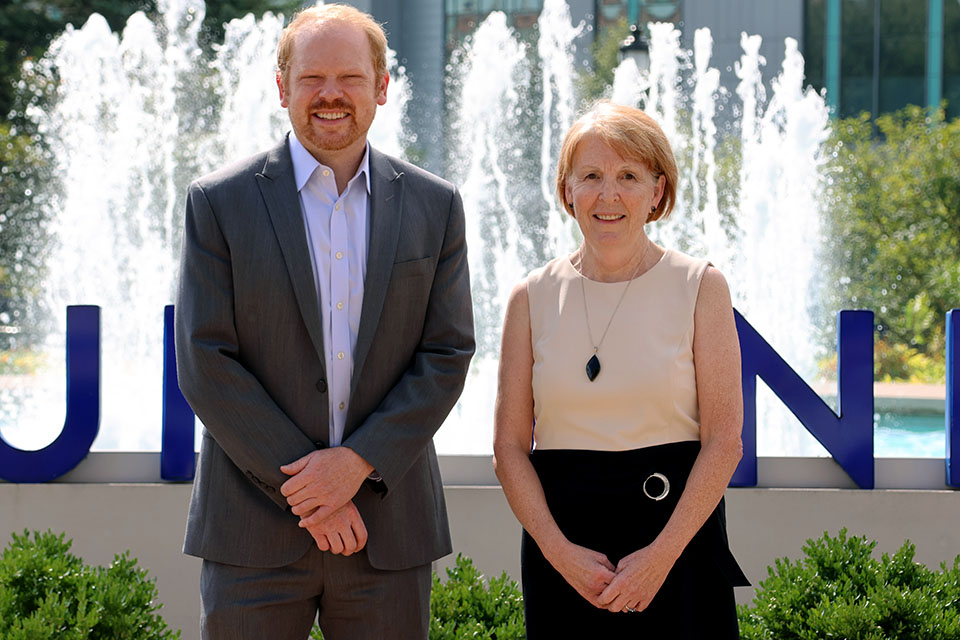With $5 Million HRSA Geriatrics Grant, SLU Prepares Workforce to Care for Older Adults
01/07/2025
Thanks to a $5 million grant from the Health Resources and Services Administration (HRSA) that extends 30 years of geriatrics-related funding to Saint Louis University, clinicians and researchers will continue to provide high-quality geriatrics education and outreach to the St. Louis region and across the state of Missouri.

Max Zubatsky, Ph.D., LMFT, left, associate professor in family and community medicine, and Marla Berg-Weger, Ph.D., MSW, right, professor emerita in social work. Photo by Joe Barker.
Marla Berg-Weger, Ph.D., MSW, professor emerita in social work and Max Zubatsky, Ph.D., LMFT, associate professor in family and community medicine, received the five-year Geriatric Workforce Enhancement Program (GWEP) grant from the Health Resources and Services Administration (HRSA), which is in the U.S. Department of Health and Human Services. Through multiple strong community and university partnerships, the GWEP program aims to educate and train health care and supportive care workforces to care for a range of issues impacting the health and well-being of older adults.
With this project, SLU and community partners across the state of Missouri and southern Illinois will help train healthcare workers and provide patient support in dementia, loneliness and social isolation, caregiver well-being, and other older adult issues. The project reaches all eight Missouri U.S. Congressional districts and a region of Southern Illinois targeting medically underserved and rural areas. Additionally, the grant will allow these regions to increase accessible education and care, improve population health areas, and integrate age- and dementia-friendly health care approaches for underserved older adults and families.
“Over the last decade, we have educated not only professionals who specialize in geriatrics, but all professionals who work with older adults,” said Berg-Weger, who serves as GWEP program director. “That includes physicians, occupational therapists, physical therapists, nurses, social workers, therapists, nutritionists, and the work force in long-term care settings. Whether it is taking more time during an exam or ensuring patients have reliable transportation once they no longer drive, there are many ways we can support older adults.”
Zubatsky, who is a co-investigator on the grant, notes that longer lifespans bring a need for more health care providers who are well trained in caring for an aging population.
“As adults live longer, there will be more opportunities to thrive, but also more chronic illnesses and caregiver demands,” Zubatsky said. “With a significant geriatric workforce shortage in our country, comes the need for new professionals, students, and specialists to recognize the importance of older adult care in our communities. This grant will support not only educating our current health care professionals around aging topics but will also help to expand the future workforce across several disciplines.”
Among its many objectives, the grant will support organizations across Missouri in rural areas and urban centers that may not have access to needed services, with a particular focus on poverty, social inequities, and specific health disparities. SLU faculty and providers will help partnering sites and underserved communities become “age-friendly” in their clinical and training services. Project initiatives include comprehensive clinical rotations for students, innovative behavioral health services for dementia and loneliness, a continuing interprofessional geriatric collaborative case competition, and launching a new apprenticeship program for certified nursing assistants working in long-term care settings.
Berg-Weger and Zubatsky lead 17 Saint Louis University faculty and staff in the initiative, including team members from SLU’s School of Medicine, Trudy Valentine Busch School of Nursing, School of Social Work, and Doisy College of Allied Health Sciences.
The grant also provides support for nine community partners, including:
- Northside Youth and Senior Services Center, St. Louis, Missouri
- Mercy Hospital Perry, Perryville, Missouri
- Missouri Delta Medical Center, Sikeston, Missouri
- Southern Illinois Health Foundation, Fairview Heights, Illinois
- Northeast Missouri Area Agency on Aging, Kirksville, Missouri
- Memory Care Home Services, St. Louis, Missouri
- University of Missouri Sinclair School of Nursing, Columbia, Missouri
- VOYCE Long-term Care Ombudsman Program, St. Louis







